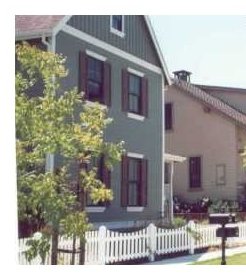

|
| weblog/wEssays | home | |
|
The Three Iron Laws of Real Estate (March 13, 2006)  We've all heard the three rules of real estate: "location, location and location."
Cute, but have you heard the Three Laws of Real Estate? They're not quite as droll.
We've all heard the three rules of real estate: "location, location and location."
Cute, but have you heard the Three Laws of Real Estate? They're not quite as droll.
 So let's look at what's happening with each of these laws in the real world.
So let's look at what's happening with each of these laws in the real world.
The reason is not hard to fathom. As interest rates rise, people can no longer afford to pay absurd sums for houses. Let's take a buyer who squeezed into a $400,000 home (or condo) with little or no money down and an interest-only adjustable-rate mortgage of the sort which has funded about 40% of the recent home purchases in California. At the starting teaser rate of 5%, the annual payments total $20,000, or $1,666 per month. (Recall that 666 is the number of the Beast...). Their property tax in the high-tax Bay Area will run at least $8,000 per year and more likely $10,000 a year, depending on the municipality. Fine and dandy, but guess what happens to the rates when the first two years are up? They rise by 40% to 80% overnight. Don't believe this? Then check out this Wall Street Journal piece Millions Are Facing Monthly Squeeze On House Payments; Many Adjustable-Rate Loans,Popular in Recent Years, Will Soon Be Reset Higher. According to the WSJ, subprime borrowers (those with less than sterling credit histories) will be paying 8%, 9% and even 10% interest soon, as the loan "catches up" to all the principal which has accumulated unpaid in the "interest only" stage. The monthly payments at 8% would rise to $2,666, plus accelerated principal payments. That's over a $1,000 more per month. Many recent home buyers won't have the equity to justify a re-fi into a lower fixed-rate mortgage, and with no other alternative, they'll walk away. Guess what happens to the foreclosed home? The lender puts it on the market so fast your head will spin. And they'll "price it to move," i.e. whatever it takes to sell it quickly, because all that bad debt on their books raises their reserve requirements drastically. And what does that mean? It means they have to keep huge quantities of cash on hand, which means they can't lend as much money, which means they can't make money, either. Which leads us to Laws Two and Three. As tens of thousands of foreclosed homes hit the market, along with the hundreds of thousands of new homes and condos currently under construction, then supply will dwarf demand. As people see prices plummeting, they'll hold off buying, further weakening demand. As demand falls, lenders will lower the price of their swelling portfolio of "distressed" properties, dropping prices further. Don't think can happen? Read what happened in the dim dark misty past of 15 years ago, when the last real estate boom died a slow agonizing death. Here is where Law Three enters the picture. Real estate is highly illiquid. There are thousands of houses and condos in a city, but only a few hundred change hands in the normal course of events--people move, they die, they get transferred, their families grow or shrink in number, they retire, etc. The salient point is: the value of 10,000 houses rests solely on the price paid for the last house sold. If prices fall, then the value of all houses falls, regardless of the purchase price or what the appraisal says. More on the consequences of these three laws tomorrow. copyright © 2006 Charles Hugh Smith. All rights reserved in all media. I would be honored if you linked this wEssay to your site, or printed a copy for your own use. |
||
| weblog/wEssays | home |